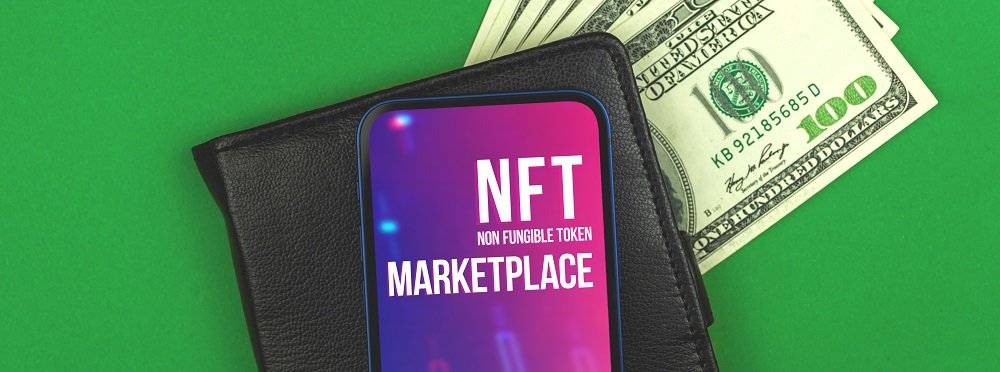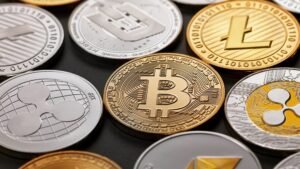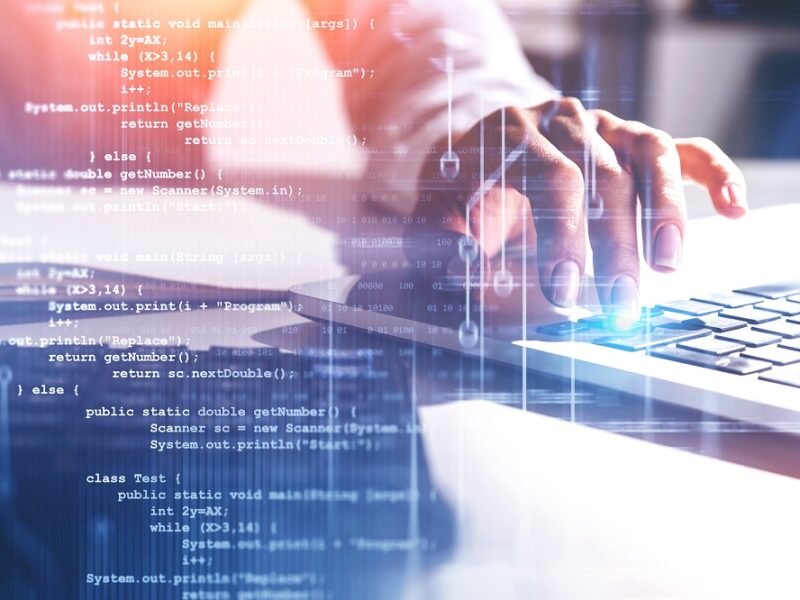NFT Investing Guide

Table of Contents
It’s fair to say that over the last year or two the entire planet has come to grips with what an exponential curve is. In the case of Non-Fungible Tokens, also known as NFTs, their growth has been nothing short of extraordinary and exponential in their own right. Although not necessarily a new entrant into the blockchain, NFTs have become much more widely popular starting in 2021.
But what are Non-Fungible Tokens and how do you buy them? Are there tax consequences? How do you use an NFT, and can they be traded like a stock? In this article, I’ll cover all this and more.
What is an NFT
I’ve been reading and watching all about NFTs for several months now and I can say that the concept can be straight forward but attempting to understand the underlying technology can send your brain into a tizzy.
To cut to the chase, let’s start with a quick YouTube video from the Wall Street Journal to explain what an NFT is before we dive too deep:
Fungibility
NFTs by their very definition are ‘non-fungible.’ Fungibility implies that something is interchangeable with like items. In the video above, an example was given how 5 one-dollar bills can be exchanged for a single five-dollar bill. This means the U.S. Dollar is fungible.
Bitcoin is an example of a fungible cryptocurrency. One Bitcoin can be exchanged for any other Bitcoin. Although they have unique hashes on the blockchain, the value of 1 Bitcoin is consistent.
NFTs don’t act like U.S. Dollars or Bitcoins. They are the opposite: they are unique… or at least that’s the goal. When a person buys an NFT, they are attempting to buy something that is scarce. The fact that there is a limited number of the item gives it value.
In the real world, think of a piece of art. Their maybe copies and copies all over the world. In textbooks, as posters, on the internet. But the original is the original. There is only one original. NFTs try to bring this same concept to digital world.
NFTs can be bought and sold just like art. The blockchain is the system of decentralized ‘ledgers’ that allow the worldwide community to verify whether or not an NFT is legitimate. The ledger system is not controlled by a single entity yet provides a robust way to guarantee that something is authentic yet also allows it to be transferred (e.g. sold to another buyer).
Think of NFTs like a seal of authenticity. It is a certificate, recorded on servers around the world and controlled by no individual, that imparts a guarantee that the owner of the certificate is in fact the owner.
New kid on the Block

NFTs aren’t necessarily new… they have been around since about 2015. Likely, however, no one you knew had ever heard of them until 2020 or later. The rise in use has increased exponentially.
The Ethereum Blockchain is the primary blockchain that is used to implement NFT transactions, but others include FLOW, Tezos, and Solana.
A wide variety of ‘assets’ can be bought as an NFT, including music, artwork, memes, trading cards, movie clips, patents and basically anything that can be stored as a file on a computer.
By applying a cryptographic signature to a file and then recording it on the Ethereum blockchain, an NFT can be created.
Benefits of NFTs
Using NFTs can provide a significant benefit to the digital economy. It does answer a need that hasn’t been met since the internet enabled the wide dissemination of information: it allows for proof of originality. But what are the other benefits?
- Can allow artists to benefit from their digital creations directly and prove authenticity.
- Can allow originators of an NFT to collect a ‘transaction fee,’ each time the NFT is sold. For example, an artist can collect a percentage of a sale each time after it is initially sold. If the value increases over time and it is sold multiple times the artist can benefit each time.
- Proof of achievements from institutions can be easily verified. Think of a College degree… how does a person absolutely prove they have one? With an NFT it would be very easy. Ownership of an achievement from an institution can be proved.
Criticisms of NFTs
There are plenty of issues regarding the entire topic. Below is a list of common critiques that you should be aware of if you are considering investing in a non-fungible token.
- Anyone can create a token. If a meme, for example, is tokenized and sold, the initial creator of the token cannot be verified (e.g. copyright infringement) to be the owner of the underlying content… only of the NFT. So, the meme could have been created by someone, then copied and an NFT created. Verification in this case is limited to the point where the product enters the blockchain.
- The value of a token depends on what others are willing to pay for it. The exponential increase of NFT use may not be permanent… think back to the beanie baby craze of the 1990s and how that ended.
- The decentralized nature of the ledger results in the transaction being record in many places. Often, the asset underlying the NFT itself is in the blockchain. This is needed to guarantee its authenticity. This creates a significant storage and energy requirement. In other words, there is a substantial carbon footprint associated with imparting authenticity and ownership guarantees that is difficult to quantify.
Where to Buy NFTs

Buying an NFTs requires exchanging cryptocurrency for the digital asset. Thus, you will need to go to a marketplace that supports this type of transaction. Which marketplace you choose will further be defined by what type of NFT you are looking to purchase… buying artwork might require a different marketplace and cryptocurrency than buying a trading card licensed by a company such as NBA Top Shot.
Below is list of various NFT Marketplaces along with the type of NFT you can buy, and the required cryptocurrency needed for exchange.
OpenSea – A diverse selection of categories. Including art, music and even domain names. U.S. Dollars or Ether is accepted.
Rarible – Mostly artwork. Uses the Rarible protocol and NFTs can be purchased with a RARI token.
SuperRare – Primarily digital art. Ether is accepted but U.S. Dollar spot prices listed.
Foundation – Digital art can be purchase here with Ether.
Are NFTs a Good Investment?
 This is a controversial topic. The bigger question is if NFTs are a good investment For You? They are not a good investment for everyone and when viewed from a lens towards earning a return based on risk they are not widely accepted as ‘investable.’
This is a controversial topic. The bigger question is if NFTs are a good investment For You? They are not a good investment for everyone and when viewed from a lens towards earning a return based on risk they are not widely accepted as ‘investable.’
If you like artwork and enjoy the asset you are purchasing, then the answer is likely yes. For example, if you buy a meme, and you derive enjoyment knowing that you own the meme the value of such an asset can only be derived from you.
Most average people couldn’t fathom spending incredible amounts of money on artwork to hang in their living room, but some people relish it. Sometimes, if the artwork was made by someone famous or has some other intangible quality the value of art can go up dramatically. But like all things, this is not guaranteed.
If you are looking to buy NFTs for no other reason than you want to eventually sell it for a profit, then buyer beware. As mentioned above, the value is only worth what someone else is willing to pay for it.
NFTs can be exchanged for large values of money only to be eventually worthless. This is no different than artwork made on canvas… not everything has value.
That said, NFTs are an asset. Buying and selling any asset implies tax consequences so make sure you keep track of your cost basis for reporting purposes.
Because of this aspect you should consider buying NFTs as a speculative asset. There is no real underlying value. These tokens can’t be used to do anything… only provide a level of satisfaction to its owner that what is was exchanged IS authentic.
All that said, if you buy an NFT created by Banksy, a world-renowned artist, it will likely go up in value many years from now… but if you buy a rookie card for a basketball player who knows what it will be worth in the future. It may end up being worthless.
What about NFT Stocks?
NFT stocks may be a better investment for those looking for exposure into this new world. Essentially, this would imply buying stocks in real companies that are in the business of or help others buy and sell non-fungible tokens.
There are numerous examples of specific companies but some that come to mind are companies such as Shopify and eBay. They have exposure to NFTs since they enable users of their platform to buy and sell tokens.
Their business models are not tied to the overall success of the technology and thus provide a level of diversified exposure.
For many investors, this may be the safest way to benefit from the blockchain without having to devote time and resources towards specific speculative assets.
Summary
NFTs, or non-fungible tokens, are a new and novel way to guarantee ownership and authenticity of digital assets. It’s clear that these financial instruments are here to stay given the value proposition they offer. In what form they take in the near or far future, however, remains to be seen.
One thing that can be said today is that investment in NFTs is speculative at best when done directly.
Investing in companies whose business models intersect with the use or transfer of NFTs may be the best way to get exposure to this burgeoning technology. Whatever way you choose to participate, be sure you understand the risks… a very difficult proposition given the nascent nature of some of the NFT products currently available.
I hope you enjoyed the article. If you have any comments or suggestions on how to make this resource better, please throw them in the comments below!
Some Common Sense
Be advised that I write this blog as an expression of my opinion. No part of this article should be considered investment advice. When it comes to putting your hard money to work you should consult professionals. Ideally Financial Advisors or Accountants that have a fiduciary responsibility to give you the best information possible.
Guy Money
As a formally trained Data Scientist I find excitement in writing about Personal Finance and how to view it through a lens filtered by data. I am excited about helping others build financial moats while at the same time helping to make the world a more livable and friendly place.



